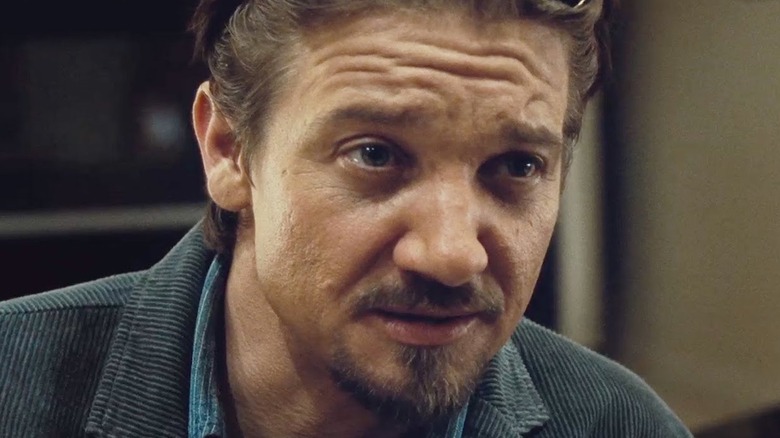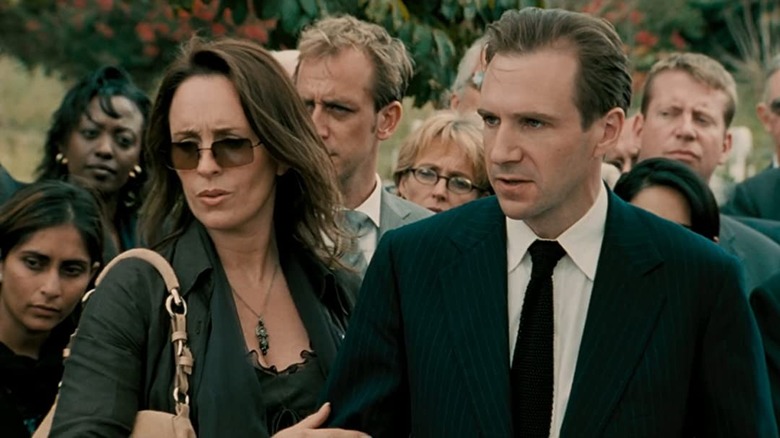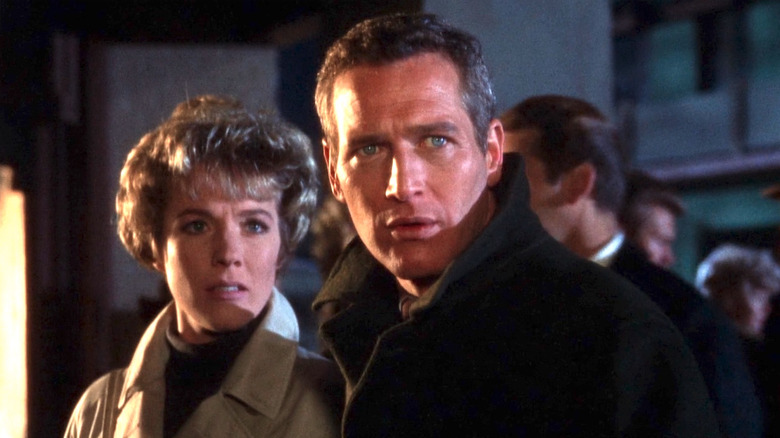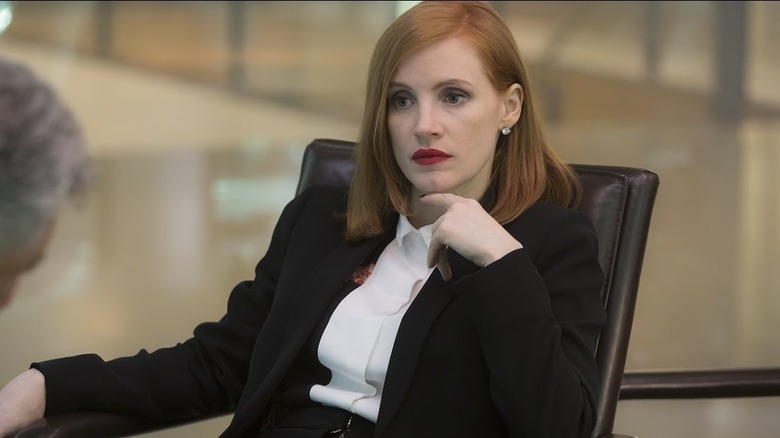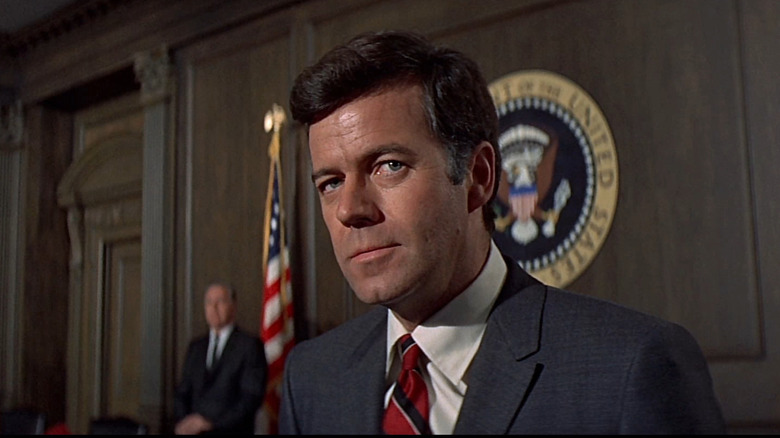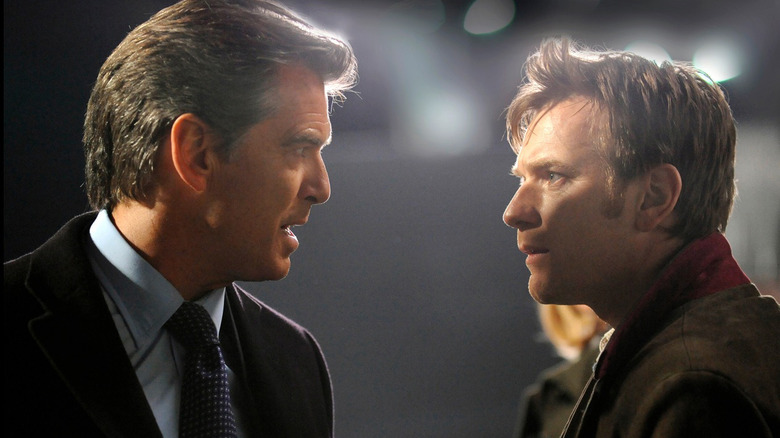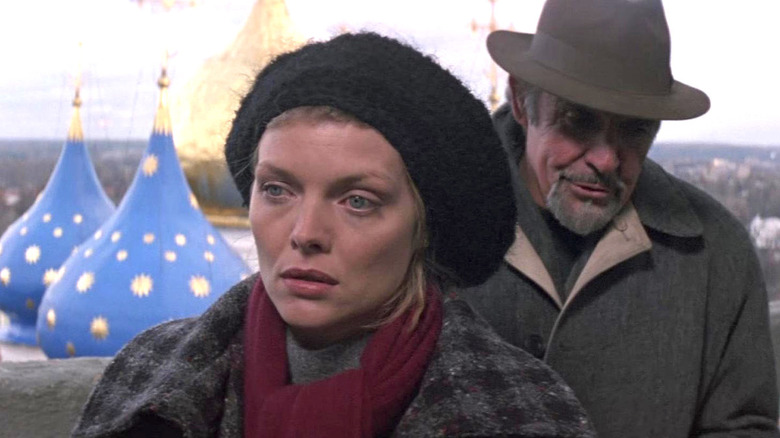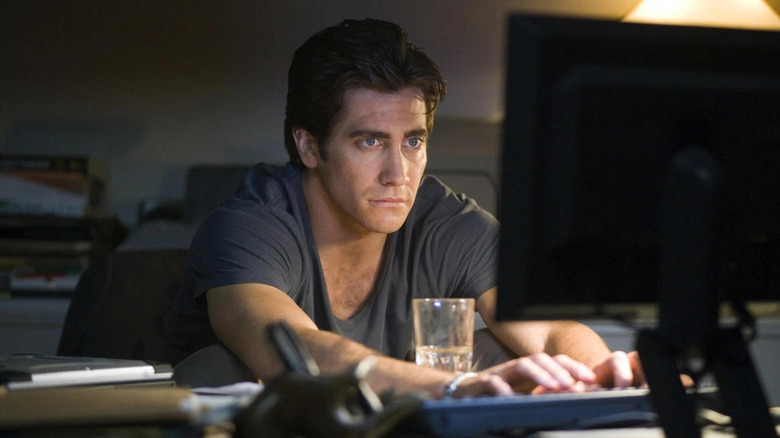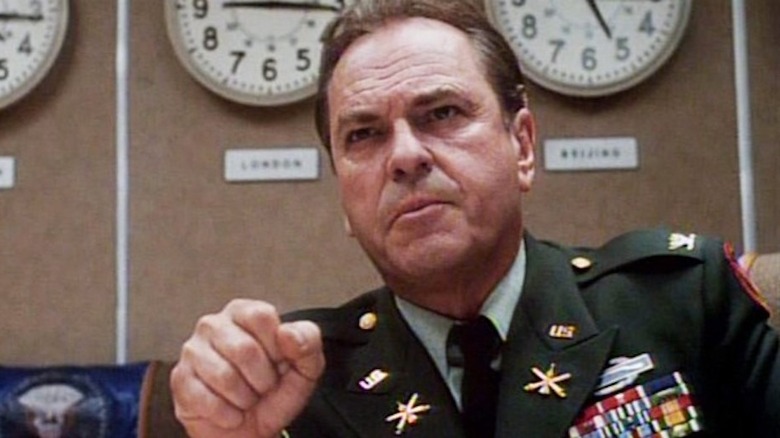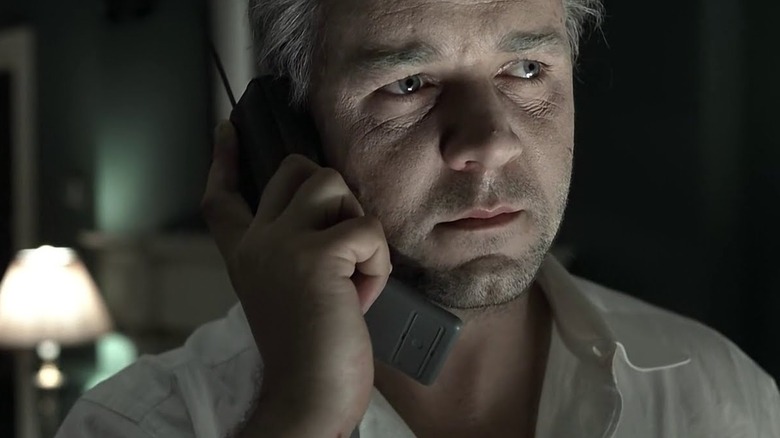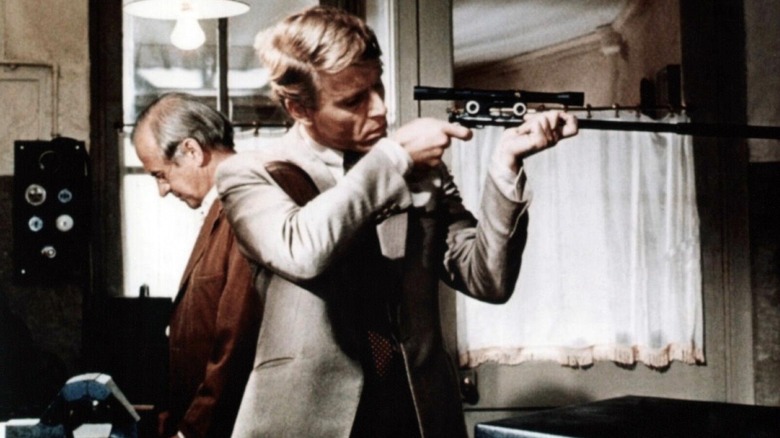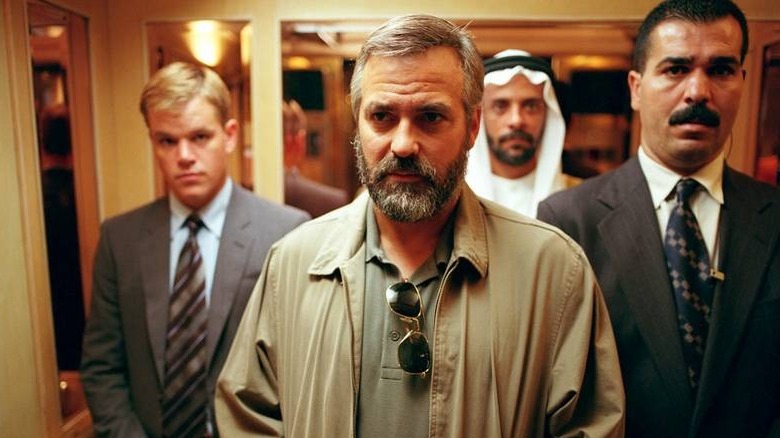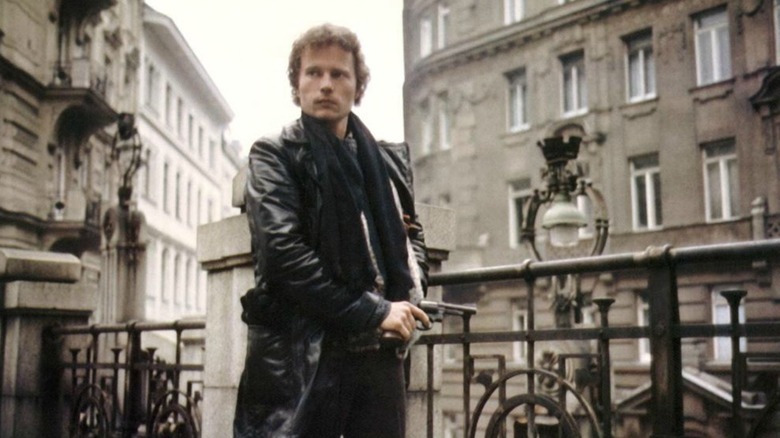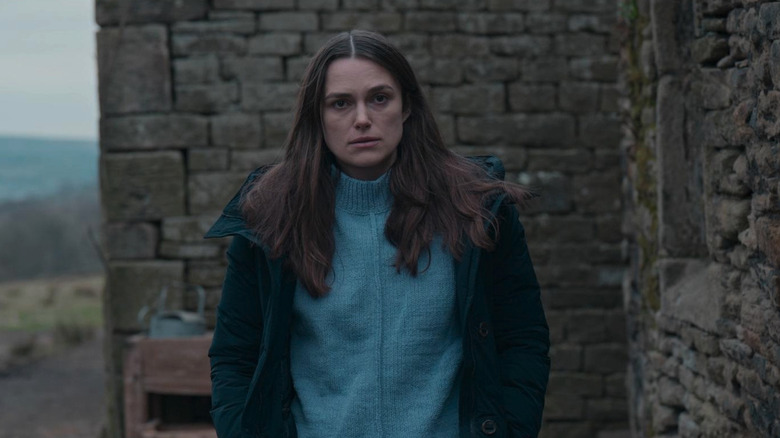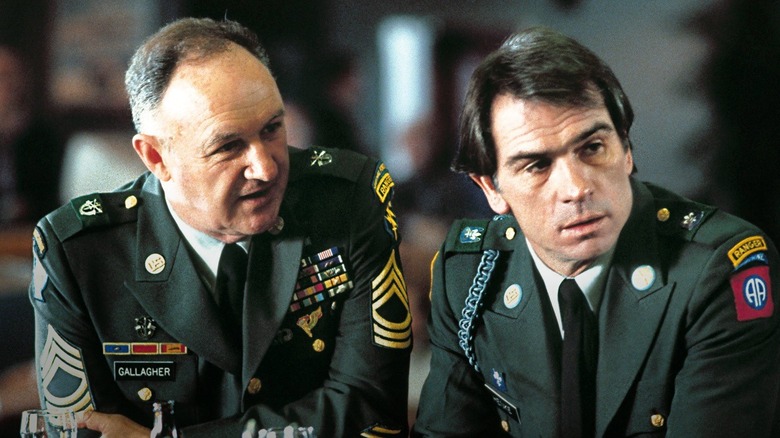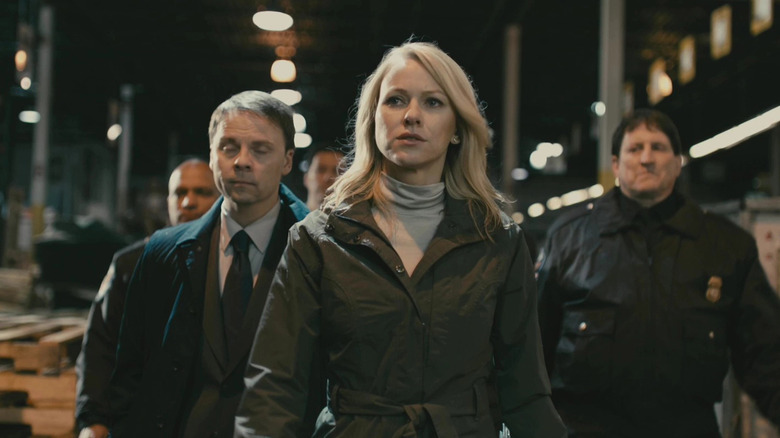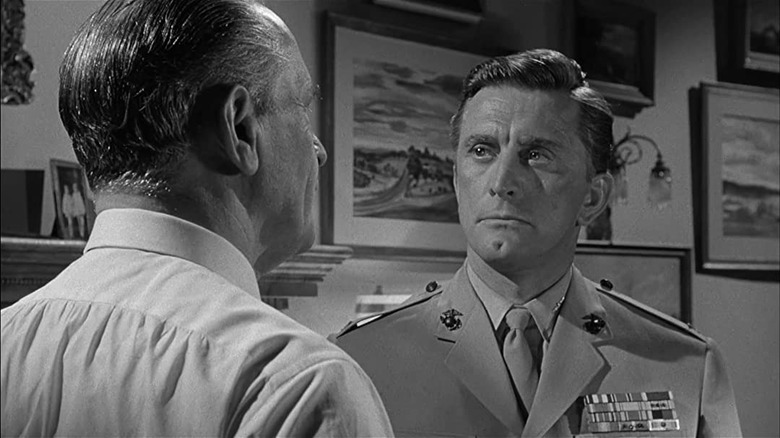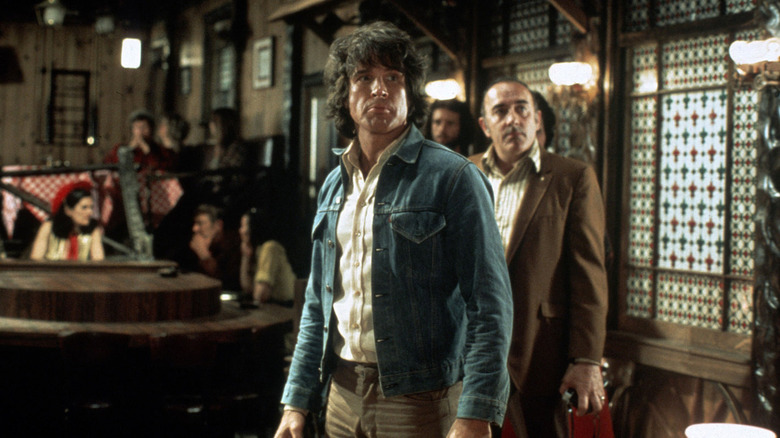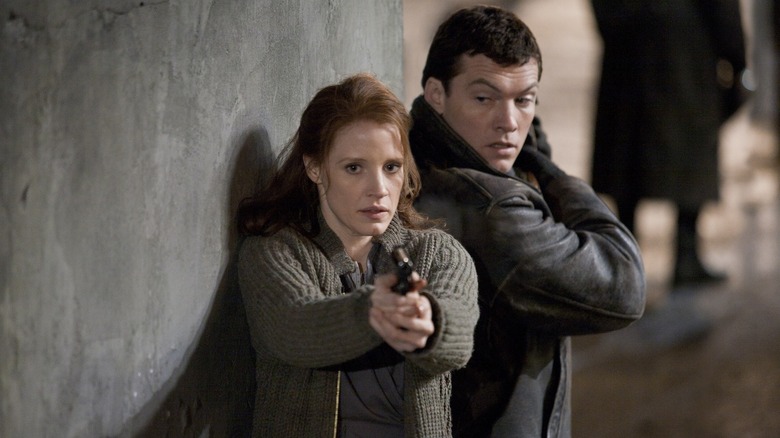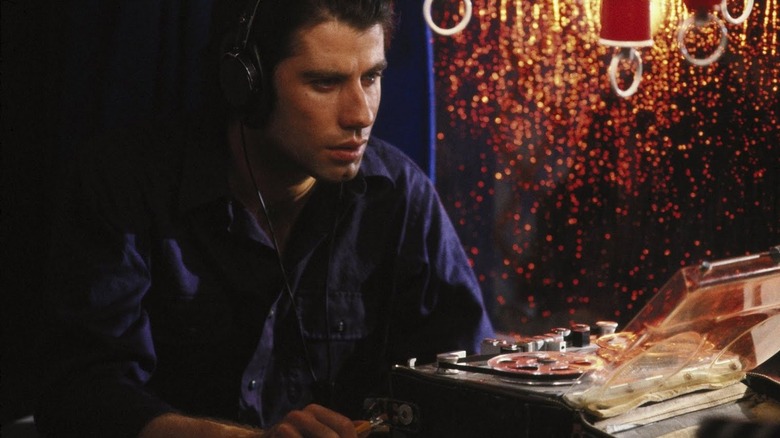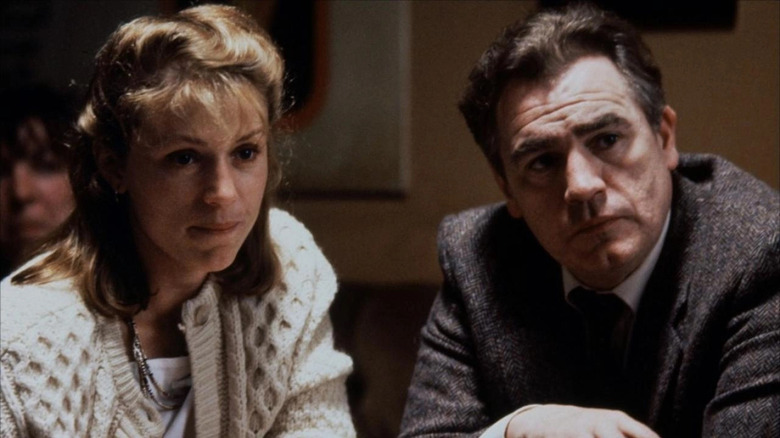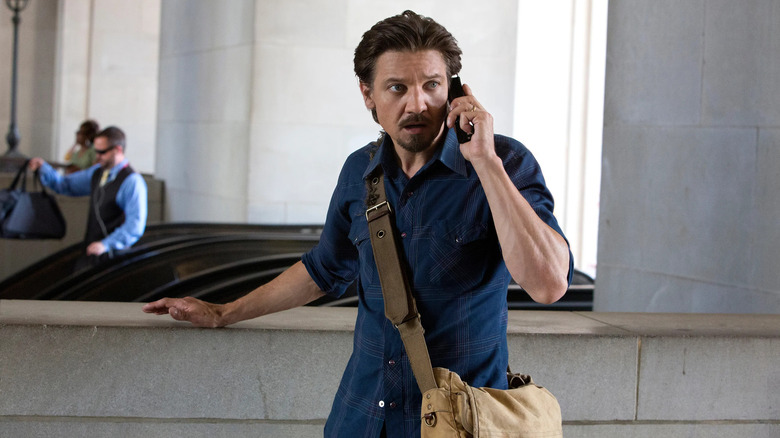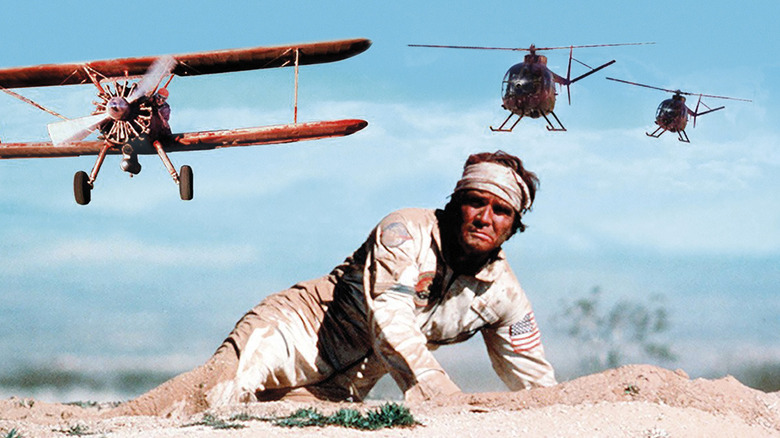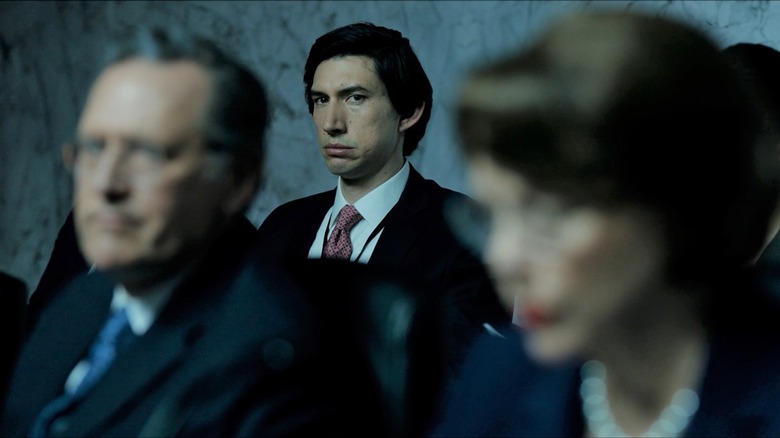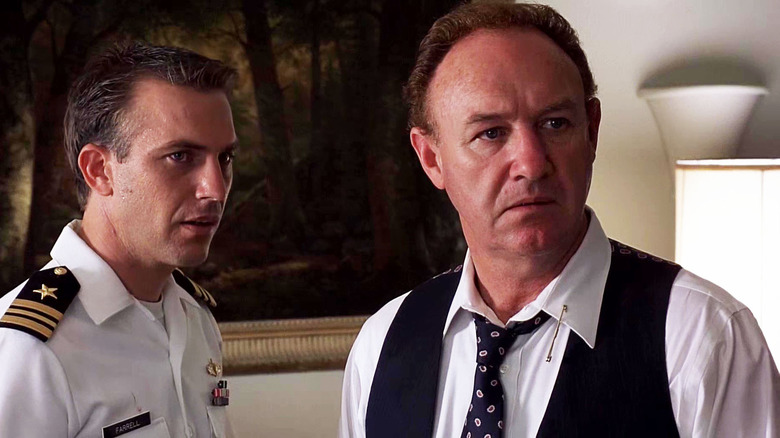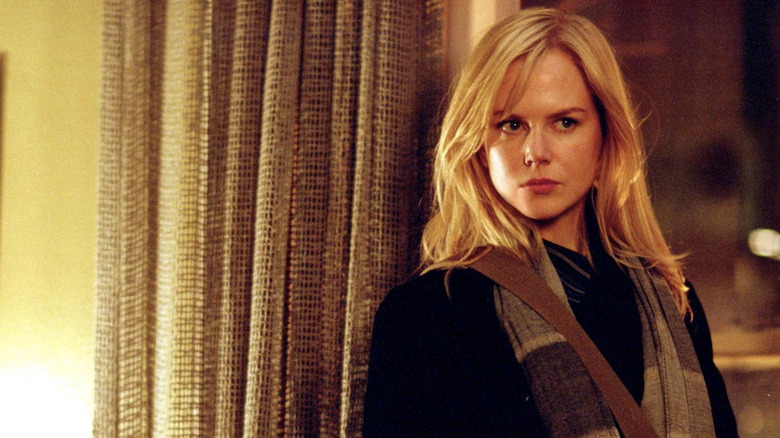25 Underrated Political Thrillers To Put On Your Watchlist
Government corruption, espionage, backstabbing, hidden agendas, assassination plots. There are few things more compelling than a good political thriller, a sub-genre that has continued to thrive well into the 21st century. Some of the most beloved thrillers of all time have involved international diplomacy, globe-trotting intelligence agents, and suspense-riddled whodunits that creep into the upper echelons of the most powerful governments. But in the 1960s and '70s, the genre arguably hit its stride with a string of Cold War era thrillers that re-invented the landscape.
All-time classics like "The Manchurian Candidate," "Fail Safe," and "The Spy Who Came In from the Cold" were born in this era, kicking off a run of Hollywood greats that saw some of the best filmmakers, writers, and actors collaborating on stories of international intrigue.
But while audiences may be very familiar with the most famous films in the genre, there are so many more that deserve your attention. So check your phone for a wire-tap and tuck that classified dossier under your coat, because we're setting out to expose 25 underrated political thrillers ... and the conspiracy goes all the way to the top!
The Constant Gardener
A couple of years after starring as the serial killer Francis Dolarhyde in "Red Dragon," and just two years before he'd join the "Harry Potter" franchise as the Dark Lord Voldemort, actor Ralph Fiennes starred as an unwitting hero in 2005's "The Constant Gardener." A stunning drama about a broad international conspiracy, the movie's cast also includes Rachel Weisz ("Black Widow"), Danny Huston ("Yellowstone"), and Bill Nighy ("Pirates of the Caribbean: Dead Man's Chest").
In the film, Fiennes plays British diplomat Justin Quayle, who gets swept up in a whirlwind romance with Amnesty International activist Tessa Abbott (Weisz). But not long after Tessa and a Kenyan doctor begin investigating reported deaths linked to an experimental drug, she is killed under mysterious circumstances. Discovering links to powerful people within his own government who are hiding sinister secrets and a multi-national corporation that may have wanted Tessa dead, Quayle realizes that his wife's death may have been part of a much broader web of lies and corruption.
"The Constant Gardener" is a taut and riveting murder mystery that shines a light on the corruption in both big business and the political world. Well-reviewed, it earned star Rachel Weisz an Academy Award, but has been largely overlooked as a first rate political thriller in the years since. Dust it off, and there's no doubt you'll get all the international intrigue you're looking for.
Torn Curtain
A tale of Cold War espionage from one of Hollywood's most acclaimed directors, you might be surprised to see an Alfred Hitchcock thriller on a list of underrated movies. But in "Torn Curtain" we have a hair-raising political suspense movie that doesn't get the praise it deserves, usually marked as one of the director's more mediocre installments. But with a cast led by Paul Newman and Julie Andrews, it tells a story of double-crosses, defections, and international scandal at the height of the Cold War that more than measures up.
Newman stars as physicist Michael Armstrong, whose work on the latest rocket technology makes him a valuable asset. But when he receives a coded message, Armstrong disappears, headed for East Germany, with his wife Sarah (Andrews) suspecting that he may have defected to the Soviet Union. Following him to Berlin, Sarah discovers that far from betraying his homeland, her husband is in fact posing as a defector for an undercover assignment to gather intelligence on a devastating new orbital missile system being developed by the Soviets.
Unfavorably compared to the James Bond films which were in vogue by 1966, "Torn Curtain" was unfortunately seen as a more generic action movie at the time, leading to lackluster reviews. But while it may not have been as celebrated as Hitchcock's then-recent masterpieces like "North by Northwest" or "Rear Window," it remains a better-than-average political thriller on its own merits and shouldn't be overlooked.
Miss Sloane
A film that explores the seedy underbelly of Washington and the dangers that lurk there, "Miss Sloane" deserves credit for examining a controversial topic that Hollywood might be hesitant to touch. Jessica Chastain stars as Elizabeth Sloane, who squares off against some of the most ruthless power brokers on Capitol Hill in a fight to pass an important gun reform bill that she firmly believes will push the country forward.
But Sloane quickly comes up against vicious fellow lobbyists who are paid big bucks by gun manufacturers to stop the legislation and ensure that the status quo is maintained. Led by rival Rudolf Schmidt (Mark Strong), these corrupt financiers are not afraid to go to dark places to achieve their goals. Soon, it's more than Sloane's work that's targeted, as Schmidt and his allies begin a coordinated effort to silence her and destroy her life.
From public hearings and activist-led demonstrations, to dark back rooms and underhanded dealings, the film is unafraid to tackle the secret world where political battles are really fought. A sterling lead performance from Chastain props up an engrossing thriller that also features Gugu Mbatha-Raw ("Loki"), Alison Pill ("Star Trek: Picard"), and John Lithgow ("Dexter"). Unfortunately, due to a limited release, few saw "Miss Sloane," a film that should be on any politically invested viewer's watchlist.
Colossus: The Forbin Project
If you like your political thrillers with a dash of science fiction, don't miss the sorely underrated — and largely unknown — "Colossus: The Forbin Project," based on the book "Colossus" by Dennis Feltham Jones. Released when most Americans lived under constant fear of nuclear armageddon, it told an eerily prescient story of a computer system gone wrong that may have seemed far-fetched in 1970, but made for a stunning story well ahead of its time.
In Washington, Dr. Charles Forbin oversees the first artificially intelligent computer system, designed to control the United States' entire military defense strategy, and the nuclear arsenal of its allies. But when the computer is switched on it detects a second system called Guardian, located in the Soviet Union. When the two advanced computers become linked, they begin refusing commands from their programmers and instead decide to take control of the world in a tandem effort to end mankind's barbaric wars. Unsure of how the Russians will respond, it's up to politicians to navigate the geopolitical fallout while Forbin must find a way to talk down the despotic computers and prevent the world's annihilation.
Though you won't find any big name actors in "Colossus: The Forbin Project," you will find first-rate suspense in an early film that explores the dangers of artificial intelligence. Though a slower, more cerebral film than most on this list, it's a captivating drama that provided audiences of the time a frightening portent of what artificial intelligence might be capable of.
The Ghost Writer
Starring former 007 Pierce Brosnan and Ewan McGregor, the 2010 film "The Ghost Writer" was adapted from a novel called "The Ghost" by Robert Harris, an expert in historical fiction. Completed while embattled director Roman Polanski was awaiting extradition to the United States in a Swiss prison (per Deadline), it's both a political thriller and a gripping murder mystery.
McGregor plays a man known in the publishing community as "The Ghost," a prolific and talented ghostwriter. Brought on to replace another writer who had been hired to pen the memoirs of Britain's former Prime Minister Adam Lang (Brosnan), he has been told that his predecessor died in an ill-timed boating accident. But as the Ghost begins digging into Lang's past as research for the book, he uncovers clues that suggest the former Prime Minister is hiding a terrible secret that may have gotten his previous ghost writer killed.
A compelling and stylishly produced film, "The Ghost Writer" went mostly unseen on its release, likely because of the serious nature of the allegations levied against director Polanski, which has led many to understandably boycott his films in recent years. But if you can bring yourself to separate the man from his work and focus on the film itself, you'll find 2010's "The Ghost Writer" to be a satisfying neo-noir political thriller that Roger Ebert called "smooth, calm, and confident."
The Russia House
A year after playing the famous father to the whip-wielding relic hunter in "Indiana Jones and the Last Crusade," veteran actor Sean Connery played a hero of his own in the 1990 political thriller "The Russia House." Set at the tail end of the Cold War, the film was released not long before the fall of the Berlin Wall.
Based on the novel by John le Carré (author of the classic "The Spy Who Came In from the Cold"), it puts another former Bond star into a leading role, this time with Connery playing a British book publisher named Barley-Scott Blair. A mysterious Russian woman named Katya (Michelle Pfeiffer) presents him with a manuscript which she says is for a new book she's written. But after reviewing the work, Blair realizes the papers contain valuable Russian intelligence, including the secrets of Soviet nuclear defenses. Now, Blair suddenly finds himself thrust into the high stakes world of spies, recruited by MI6 and the CIA to track down Katya so they can confirm the manuscript's authenticity.
Even though The Washington Post praised "The Russia House" as one of the best films of 1990 and gave Pfeiffer high marks for an award-worthy performance, the film was quickly buried by other bigger movies that year. But with a strong cast that includes Roy Scheider as a CIA agent, it might need to be at the very top of your watch list.
Rendition
A good political thriller will be filled with stunning revelations of dark government conspiracies and sinister plots executed by the world's most ruthless global powers. But the most captivating political thrillers are the ones based on a true story, where every incredible, jaw-dropping twist and turn is something that really happened. Such is the case with 2007's Gavin Hood-directed "Rendition," starring Jake Gyllenhaal, Reese Witherspoon, Meryl Streep, Adam Arkin, and Peter Saarsgard.
Based on the remarkable true story of Khaled El Masri, a German man who was abducted in a tragic case of mistaken identity (via ACLU), the film recounts the harrowing ordeal of an ordinary man caught up in a CIA mission to prevent a devastating terrorist attack. Gyllenhaal plays CIA Agent Douglas Freeman, who is skeptical of the man's guilt despite the evidence that suggests they have the right person. Back home, the man's wife (Witherspoon) sets out on a campaign to have her husband freed from custody once she learns he's been abducted by U.S. intelligence, but American officials are unable to even acknowledge his existence.
On its release, "Rendition" received decidedly mixed reviews, but this is one movie on our list of underrated flicks where critics missed the target. The cast is stellar, the story engaging, and like any great political thriller, it will keep you wondering what dark secret is lurking around every corner.
By Dawn's Early Light
There have been great political thrillers on the big screen, classics that star some of Hollywood's greatest actors, helmed by award-winning directors. But that's not the only place to find a stunning story told in the genre — look to the small screen and you will find a few hidden gems too. That's where we find "By Dawn's Early Light," a 1990 HBO Original Movie famous for being the final film to depict a clash between the United States and Russia while the two powers were still locked in a cold war in reality (per Matte World).
Though neither power is calling for war, dissidents in the Soviet Union strike a region in their own country with a tactical nuke. But due to a misreading by Russian strategic response computers, Russia believes the attack was launched by NATO and its allies, prompting a counterstrike at the United States. Though U.S. command receives word that the attack was a mistake, with assurances from Russian leadership — who all but beg them not to hit back and risk Armageddon — American politicians and military officials are unsure how to respond, and must weigh the risks.
The film's all-star cast is led by James Earl Jones, Rebecca DeMornay, Rip Torn, and Martin Landau as the President of the United States. A tension-filled nail-biter, "By Dawn's Early Light" portrays a realistic scenario that sees the Doomsday Clock tick past midnight.
The Insider
All-time greats like "The Manchurian Candidate" and "All the President's Men" feature some of Hollywood's biggest talent in front of and behind the camera. You might think that when a high-caliber political thriller has names as big as Frank Sinatra and Robert Redford it couldn't ever be underrated, but think again. Despite starring Russell Crowe and Al Pacino, "The Insider" has somehow escaped the notice of many since its release.
Directed by Michael Mann ("Heat"), the film looks at a different side of politics, focusing on the corruption in big business. Crowe stars as Jeffrey Wigand, a tobacco company employee who is being pursued for a story by television producer Lowell Bergman (Pacino). But when he makes a controversial appearance on a popular news program, Wigand becomes the target of the entire country's ire, and must dodge not just criticism from the public, but death threats as well, as he becomes the target of powerful people who could stand to lose billions if their secrets are exposed.
Based loosely on a true story, "The Insider" earned seven Academy Award nominations and was rightfully hailed by critics as a high class thriller at the time of its release. But no matter how highly acclaimed it was by critics, it never seems to enter the discussion of the best political thrillers when it more than deserves to be counted among them.
Day of the Jackal
Some of the best movies of the genre were skillfully crafted in the 1970s. Perhaps the wave of classics was inspired by the political intrigue present in the real world in the wake of domestic and foreign affairs that caught powerful figures like Presidents Lyndon Johnson and Richard Nixon in national scandals, while assassinations of political figures seemed shockingly common. From "3 Days of the Condor" to "Marathon Man," the decade was rife with all-time greats, but plenty more seem to have fallen out of the popular canon as time has gone on. One of those is the 1973 film "Day of the Jackal."
The year is 1962, and France has just granted independence to Algeria, infuriating a group of hard line militants who have long opposed the current French government under the leadership of Charles de Gaulle. After a series of assassination attempts on the president's life prove fruitless, the group hires a shadowy killer known only as The Jackal to take out de Gaulle once and for all. But hot on his tail is Claude Lebel, a shrewd lawman brought in to stop him.
Even though it wasn't a box office hit, "Day of the Jackal" was met with good reviews, and has gone on to cult status. Ironically, a 1997 remake titled "The Jackal" starring Richard Gere and Bruce Willis was the polar opposite, getting roasted by critics but becoming a financial success in theaters.
Syriana
When it comes to political thrillers, you'll rarely find films with such sprawling, epic productions as this 2005 George Clooney vehicle. While filmmakers trotting the globe to shoot on multiple continents is largely reserved for major blockbusters like James Bond movies, location shooting for "Syriana" took place in the United States, Dubai, and Casablanca in Morrocco (via TCM). As director Stephen Gaghan told Charlie Rose, this spellbinding and multi-layered story is supplemented with dialogue pulled from real life discussions that he had with powerful tycoons, media magnates, and foreign dignitaries.
A film with several intertwining narrative threads, Clooney stars as Bob Barnes, a CIA agent who is tasked with assassinating the enigmatic Prince Nasir, but discovers a much more sinister plot as his mission unfolds. Meanwhile, energy analyst Brian Woodman's son is killed while on a business trip to the Prince's estate. At the same time, in a separate storyline, American lawyer Bennett Holiday is working on a controversial merger between two major oil producers in the region and must convince the government of its usefulness ... and lawfulness.
An impressive ensemble cast surrounds Clooney, including the likes of Matt Damon, Jeffrey Wright, Christopher Plummer, and Alexander Siddig. Though Clooney won an Academy Award for his performance, the film didn't get near the Oscar recognition it deserved. Today, the film is fondly remembered by those who've seen it, but it needs more love, and has earned the right to be included on any list of great political thrillers.
The Amateur
Though "Syriana" gained its underrated status by being a well-received hit that was forgotten too quickly, 1981's "The Amateur" makes our list in a different way. A flop in theaters that only got mixed reviews, the film secures its spot by being a mesmerizing thriller that few audiences saw, and even fewer remember today. Starring John Savage ("The Deer Hunter") and directed by Charles Jarrott ("Mary, Queen of Scots"), it centers on a CIA analyst who goes on a mission to avenge his murdered wife.
Though he's not a highly trained sharp-shooting spy, CIA cryptologist and desk jockey Charles Heller (Savage) is looking for justice when his wife is murdered by group of terrorists in Munich, Germany. Desperate to find her killers, Heller forces his own superiors in the CIA to train for him for a more hands-on mission to track down those responsible and bring them to justice. But when he arrives and begins his manhunt, Heller quickly discovers that his wife had been just a pawn, killed in an effort to lure him out into the open and onto their home turf.
A predecessor to the likes of "Jack Ryan," "The Amateur" explores a similar story about a desk-riding intelligence agent who is forced into the role of field operative, and is a pioneering action thriller of the highest order.
Official Secrets
The world can be a troubling place based on what we see on the nightly news, with wars and conflict at home and abroad often as disturbing as any fiction. But if that's what the people in power will let us see, can you imagine what darkness goes on behind closed doors, orchestrated by the people who really pull the strings? Well, there's one underrated political thriller that does just that: the 2017 film "Official Secrets" starring Kiera Knightley.
Based on a shocking true story, the film pulls back the curtain on the world's greatest global conflicts that are said to be fought in the name of peace and the preservation of freedom and democracy abroad. Set in 2003, Knightley stars as a linguist and British intelligence agent named Katherine Gun, who discovers a secret plot to coerce government officials in the United States and Britain into voting for a referendum on the pending invasion of Iraq. Realizing that the war may not be the what many have been led to believe, Gun leaks the memo to a journalist (Matt Smith) in the hopes of getting the information to the public.
But Gun soon discovers that her hopes of getting the truth out may have deadly consequences. An important film that shines a light into the shadow world of geopolitical machinations in the aftermath of 9/11, "Official Secrets" was sadly buried due to a limited release.
The Package
As the 1980s wore on, a number of action films leaned into the real-life tensions that were coming to a head between the U.S. and the Soviet Union. This included classics like "Red Dawn" and "Top Gun," while even the fourth "Superman" film centered on an attempt by both nations to disarm and eliminate all nuclear weapons. Oddly enough, another Cold War-era action thriller — starring Lex Luthor himself, Gene Hackman – features a similar premise to that comic book sequel: the 1988 film "The Package."
In a fictionalized version of what could happen if America and the Soviet Union made peace, the movie sees the U.S. President and the Soviet Prime Minister engaged in talks to completely eliminate their nuclear stockpiles. But secretly, hard-line elements from both sides begin forming a unique coalition to derail the negotiations in an attempt to continue the status quo. But when Green Beret Master Sergeant Johnny Gallagher is tasked with escorting a soldier back to the U.S. for court martial, he uncovers the terrifying plot and realizes it goes much deeper than anyone expected.
Also starring Tommy Lee Jones ("The Fugitive"), Pam Grier ("Jackie Brown"), Dennis Franz ("NYPD Blue"), and Joanna Cassidy ("Blade Runner"), "The Package" is a conspiracy story that speaks to the very real fears that many had of making peace with the Soviet Union. Strangely, the film's underlying plot of peace between rivals getting sabotaged from within was mirrored three years later in outer space in "Star Trek VI: The Undiscovered Country."
Fair Game
Some of the best true-to-life political thrillers also serve as biopics chronicling the life of a singular individual, like the 2010 film "Fair Game." From the mind of director Doug Liman just a few years before he'd helm the groundbreaking sci-fi actioner "Edge of Tomorrow," the cast is headlined by acclaimed actors Sean Penn and Naomi Watts. It tells the story of former CIA agent Valerie Plame, whose identity was leaked to the press in a widely publicized international scandal known as the Plame Affair in 2003 (via The Washington Post).
It's a time of great turmoil in the United States as pressure to retaliate against the nation's enemies in the Middle East has led President George W. Bush to pursue a war against Iraq. Backed by claims that the nation's leader Saddam Hussein is developing a nuclear arsenal, diplomat Joseph Wilson (Penn) is sent to investigate the matter to gather intelligence on Iraq's international activities. But when he publishes an op-ed that casts doubt on those assertions, hidden figures with menacing motives look for retaliation, and strike at his wife Valerie (Watts) by leaking her identity as an undercover agent to the press.
A shocking true story that has somehow faded into the annals of history, "Fair Game" shows how low even our most noble politicians can sink in the name of a ruthless cause.
Seven Days in May
If you're looking for an underrated gem with an impeccable pedigree, look no further than the 1964 drama "Seven Days in May." Just two years after defining the genre with "The Manchurian Candidate," director John Frankenheimer teamed with "Twilight Zone" creator Rod Serling, who was still at his creative peak, having only recently concluded his sci-fi anthology series. In front of the camera, the film features superstars Kirk Douglas and Burt Lancaster in a staggering political thriller that details an unthinkable domestic coup within American borders.
As the film begins, the world is rife with chaos and the nation is on the brink of war. A deeply unpopular President (Frederic March) presides over the country's future, and many within his own administration — and the military — fear his peace-loving ways will drag the United States down with him. Douglas plays USMC Colonel Martin Casey, who gets wind of a plan by the President's own chief of staff, James Mattoon Scott (Lancaster), to push the President aside and take control of the nation himself.
Released just a year after the assassination of President John F. Kennedy, believed by some to be too weak to stand up to the Soviet Union (via PBS), "Seven Days in May" posited a frightening scenario that while provocative, suddenly seemed all too plausible.
The Parallax View
Some underrated political thrillers are widely known, as our next entry is, but are somehow never mentioned alongside the greats. Starring Warren Beatty, "The Parallax View" was an attempt to capitalize on the emerging genre, as stories about espionage, assassins, and diabolical conspiracies were gaining serious popularity. Though mostly underrated as a political thriller today, it's most widely known for a controversial but expertly crafted montage sequence — a film within the film and an exceptionally eerie presentation used during a disturbing brainwashing sequence.
But while the much talked-about montage is definitely a highlight of the film, there's so much more to "The Parallax View" that doesn't get enough credit. Having arrived at a time when the real world was dealing with high-profile assassinations and political scandals, the movie begins with death of the U.S. President, who many believe was killed by a lone gunman. Three years later, intrepid reporter and conspiracy theorist Joe Frady becomes convinced that there were more involved after several witnesses to the assassination wind up dead themselves. His investigation leads him to the ominous Parallax Corporation, and Frady believes that they may be preparing to act on a new target.
A stirring thriller that will leave you gobsmacked, "The Parallax View" has become a cult classic, and is easily the most underrated '70s film in the genre.
The Debt
The political thriller as a genre has evolved over the years, from taut, suspenseful thinkpieces to more action oriented tales. Following the turn of the millennium, the genre saw renewed interest, with stories centered on global geopolitics and government conspiracies, with an understandable emphasis on plots involving terrorism in the Middle East. While this trend had a big impact on television, with hits like "24" and "Homeland," it also left its mark on movies, including the underrated 2010 film "The Debt," starring Jessica Chastain, Helen Mirren, and Sam Worthington.
Mostly set in 1965, the film follows Rachel Singer (Chastain), a new recruit of Mossad, Israel's intelligence agency. Joined by veteran operative David Peretz (Worthington), Singer is sent on a mission to Berlin where they believe they've located a man known as the Surgeon of Birkenau, a war criminal who has escaped their grasp for decades. The pair become national heroes after successfully taking out their target, but 30 years later, another man claiming to be the real Surgeon of Birkenau emerges. Now, after three decades, an older Singer (played by Helen Mirren) must return to Germany to find answers.
A bit heavier on the action than most on this list, "The Debt" was an indie movie with a limited release that sadly went overlooked in 2010. But reviews have always been strong, and if you like a compelling mystery in your political thrillers, this one should satisfy.
Blow Out
With the assassination of a number national political figures in the 1960s, the '70s became a hotbed of movies about presidents and politicians suffering similar fates. This includes Burt Lancaster's "Executive Action" and the 1979 black comedy "Winter Kills," but the trend also bled into the 1980s with the lesser-known John Travolta thriller "Blow Out." An underrated film, it sees an ordinary young man come across evidence of a plot to kill a politician who is in the running for the next presidential election.
Two years before he directed "Scarface," Brian De Palma brought audiences this story of a different kind of organized crime, with a young movie maker played by John Travolta who unknowingly witnesses and records the death of Pennsylvania Governor George McRyan in a deadly car accident. Re-examining the audio he recorded of the incident, he uncovers evidence that the crash may not have been an accident at all, and may have been part of a plot to snuff out a rival candidate for President of the United States.
Given stellar reviews, noted critic Roger Ebert praised its slowly unwinding mystery, high tension, and visual storytelling that he likened to the best Hitchcock thrillers. At the box office, though, the movie was a misfire, and has since become one of the lesser known movies in both DePalma and Travolta's long filmographies.
Hidden Agenda
A tried-and-true starting premise for a satisfying political thriller is a murder, followed by an investigation that slowly reveals a broader political conspiracy. But when a plot point is so well-worn it's usually for a good reason — because it works — and we get it again in "Hidden Agenda," a 1990 film starring future Academy Award winner Francis McDormand. She's joined in the film by Brian Cox ("X2: X-Men United") and Brad Dourif ("The Lord of the Rings") in a story that sets her on a quest to find her husband's killer.
It all takes place in Northern Ireland, where strife has brewed for decades between British and local forces. American human rights lawyer Paul Sullivan turns up dead, and though the authorities claim to have gotten the killer, his girlfriend and assistant Ingrid (McDormand) isn't buying it. Together with the help of a high-ranking British Inspector (Cox), they soon learn that Sullivan had come into possession of evidence of corruption in the British government that could rock the foundation of the commonwealth if it were ever discovered.
Controversial for its frank critique of British policy at the time, "Hidden Agenda" was well-received by critics but has never gotten the attention or credit it deserves as a top flight political thriller.
Kill the Messenger
Political scandals would go undiscovered, remaining hidden from public view, if not for the courageous efforts of investigative journalists who treat conspiracy theories as breadcrumbs down a winding road. Going up against some of the most powerful people in the world who have the money and the influence to ensure their darkest secrets stay that way, reporters need not just detective skill and writing prowess, but guts and tenacity, making them the perfect subject for an exciting thriller.
Among the canon of underrated movies focused on a resolute reporter is the 2014 biopic "Kill the Messenger." The film was based on a book of the same name that detailed the exploits of journalist Gary Webb, and how he uncovered a link between the cocaine trade and the CIA's activity in Nicaragua. Beginning with what he believes is an otherwise innocuous story about civil asset forfeiture, Webb soon stumbles upon evidence that the U.S. government may have played a part in widespread drug trafficking going back more than a decade, and while following his lead, he becomes a target of the CIA, who not-so-subtly threaten him to stay away from the story.
A rock solid tale that's part chase film, part conspiracy thriller, part action movie, we can't figure out how "Kill the Messenger" escaped notice. But it's a high octane nail-biter with an ending that may prompt you to do your own investigating to get to the truth.
Capricorn One
There are few conspiracy theories more fascinating than the notion that the American government faked the moon landing in 1969, unwilling to let the Soviet Union beat them to the lunar surface, and unable to actually achieve the feat themselves. Some even posit that filmmaker Stanley Kubrick was hired to film the landing on a sound stage thanks to his work on the groundbreaking sci-fi film "2001: A Space Odyssey." It may have been this wild theory that inspired an underrated 1978 political thriller, "Capricorn One."
Directed by Peter Hyams (who ironically went on to helm the "2001" sequel, "2010: The Year We Make Contact" in 1984), the film sees NASA preparing to launch the first manned mission to Mars when the astronauts who have trained for the sojourn are mysteriously removed from the flight. But to their astonishment, the mission proceeds without them, and they are told that because of a problem with the capsule, they're being forced to fake the flight, and need to help convince the public that the mission has been a success. But one intrepid reporter (Elliott Gould) gets wind that something fishy is going on, and threatens to unravel the entire operation.
Though you'll need to suspend a little disbelief, "Capricorn One" acts as a twisted take on the classic sci-fi formula of a daring mission to space.
The Report
A number of political controversies swept the globe in the wake of the September 11th terrorist attacks, which in the years since have given rise to new political thrillers that put those scandals under a microscope. While movies like "Official Secrets" delve into the motivations for the war in Iraq, "The Report" follows the story of an FBI agent's investigation into the CIA's so-called "enhanced interrogation" of suspected terrorists.
Adam Driver ("Star Wars: The Force Awakens") stars as real-life FBI agent and Senate investigator Daniel J. Jones, who in 2009 begins looking into the mysterious destruction of CIA records that detail the agency's Detention and Interrogation Program. Assembling a special team, Jones begins probing the CIA's activity, and learns that in the years following 9/11 they were given extraordinary discretion by then-President George W. Bush, and used it to torture and detain anyone they felt might be a domestic threat.
"The Report" may lack the pulse-pounding excitement or gripping suspense of more action-laden thrillers in the genre, instead opting for a more analytical approach to the story. But what it lacks in suspense it makes up for with award-worthy performances from Driver and his supporting cast, and a fascinating story that looks at how horrifying truths are often kept from the American people, and justified in the name of freedom.
No Way Out
Hollywood star Gene Hackman, thanks to a star-making turn in the iconic film "The French Connection," quickly became the go-to actor for first-rate thrillers, and many of his best were of the political kind. We could fill an entire list of underrated Gene Hackman thrillers, but our pick here is the 1987 film "No Way Out," where he starred alongside up-and-comer Kevin Costner, the same year he'd become a star in Brian DePalma's "Untouchables."
The film sees Costner in the role of U.S. Naval officer Tom Farrell. A young lieutenant, Farrell begins a passionate affair with Susan Atwell, who also happens to be the mistress of David Brice (Hackman), the U.S. Secretary of Defense. But when Atwell is killed by a jealous Brice after discovering her dalliance, the investigation instead turns Farrell into the prime suspect. Out to clear his name, Farrell follows a trail of evidence that threatens to expose a number of dangerous secrets.
A clever neo-noir thriller, "No Way Out" works like a 1950s suspense classic fueled by eye-popping revelations, with a dark and foreboding atmosphere and a modern twist. Bigger films tend to hog the spotlight in Hackman's and Costner's careers, and this one has sadly fallen to the wayside. But if you're a fan of the genre or of either actor, it isn't to be missed.
The Interpreter
Sydney Pollack is a name that any fan of political thrillers should recognize, having crafted what is considered one of the most defining films of the '70s, "Three Days of the Condor," starring Robert Redford. He'd return to the genre in 2005, with the Sean Penn/Nicole Kidman thriller "The Interpreter," a story that stirred quite a bit of controversy itself, even accused of being CIA propaganda by Zimbabwe's President Robert Mugabe (via The Jamaica Observer).
The film centers on a fictional African nation where warlord President Zuwanie has been engaged in brutal tactics, with allegations of ethic cleansing coming from his enemies and the diplomatic community. At a United Nations summit where Zuwanie will appear to address the accusations, U.N. interpreter Silvia Broom overhears a conversation that hints at a plot to assassinate the African President. But after learning that her brother has been killed by his regime, Broom — with the help of a U.S. Secret Service agent (Sean Penn) — looks for answers, putting herself in the path of a deadly international plot.
Mixed reviews of the film criticized some of its winding plot, but "The Interpreter" remains a smart and stylish political thriller that should not be underestimated.
